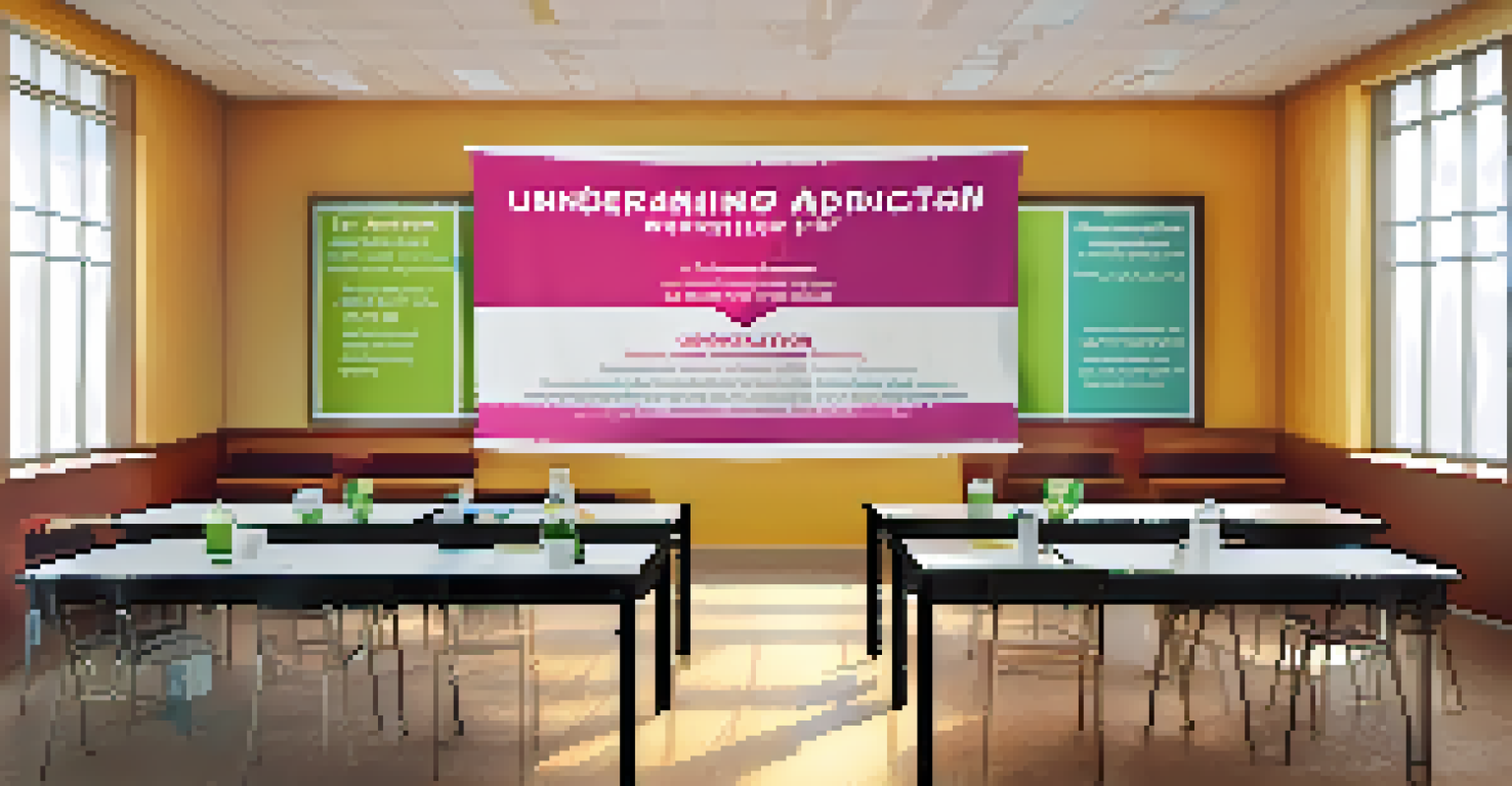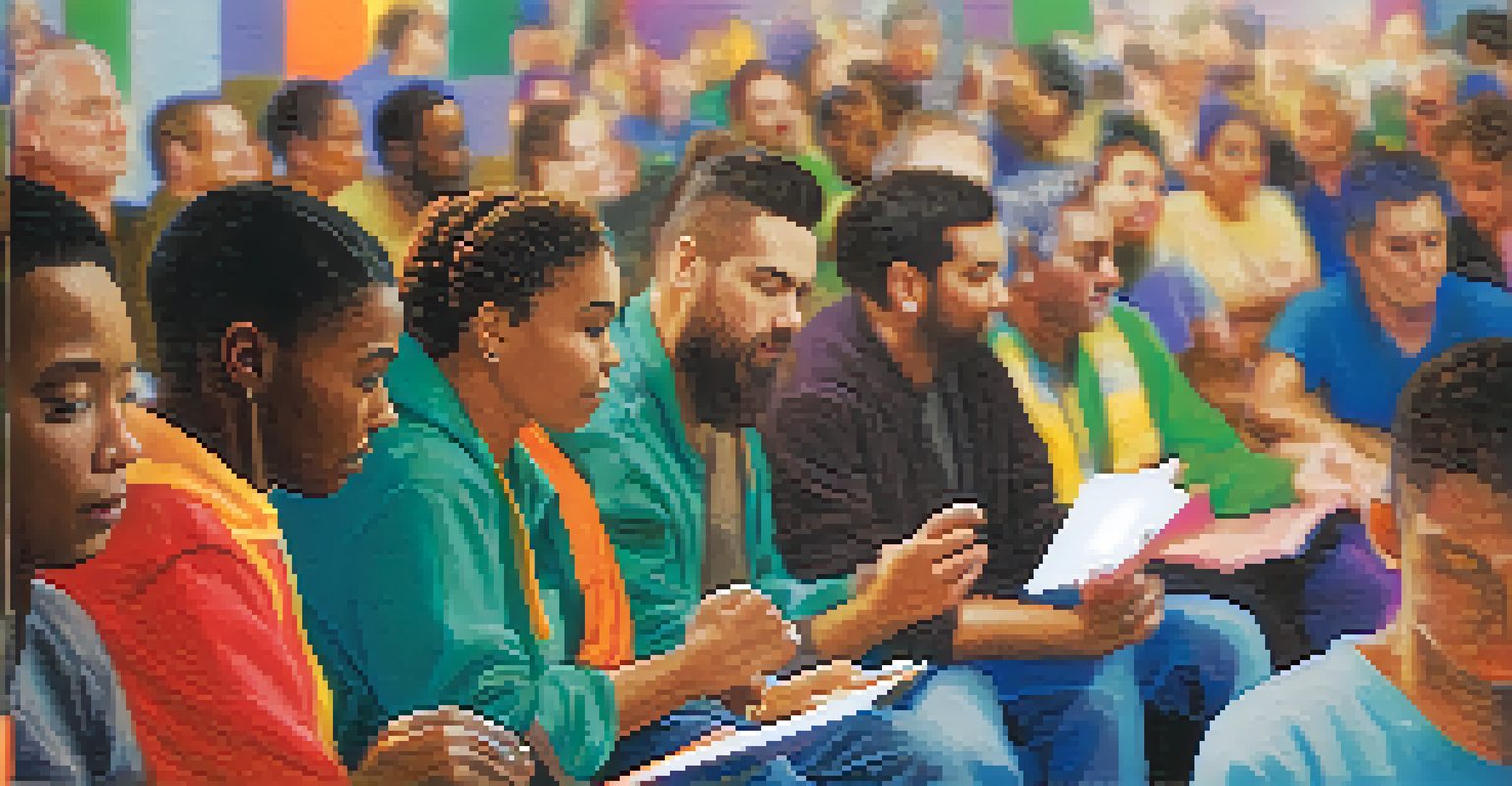The Effectiveness of Workshops on Addiction Awareness

Understanding Addiction and Its Challenges
Addiction is a complex condition that affects millions globally. It often involves a compulsive engagement with a substance or behavior despite negative consequences. Understanding the intricacies of addiction can be the first step in addressing it effectively.
Addiction is a disease, not a moral failing.
Many individuals struggle with misconceptions about addiction, viewing it solely as a personal failing rather than a multifaceted health issue. This misunderstanding can hinder open discussions and limit support for those affected. Workshops aim to bridge this gap by educating participants about the true nature of addiction.
By providing clear information and fostering empathy, workshops help participants grasp the emotional and psychological challenges faced by individuals in recovery. This foundational understanding is crucial for building a supportive community.
The Role of Workshops in Raising Awareness
Workshops serve as a platform for sharing knowledge and experiences related to addiction. They often feature expert speakers, interactive activities, and discussions that engage participants actively. This hands-on approach enhances understanding and retention of information.

By involving participants in discussions and activities, workshops create a safe space for sharing personal stories and insights. This sharing can demystify addiction and reduce stigma, encouraging more open conversations on the topic. Such dialogues are vital for fostering a supportive environment.
Workshops Enhance Addiction Awareness
Workshops provide a platform for sharing knowledge and personal experiences, helping to reduce stigma around addiction.
Additionally, workshops can introduce participants to available resources and support systems. Knowledge of local services and hotlines can empower individuals to seek help for themselves or loved ones, further promoting awareness and understanding of addiction.
Key Components of Effective Workshops
For a workshop to be effective, it should incorporate several essential elements. First, knowledgeable facilitators who can present accurate information and answer questions are crucial. Their expertise helps build credibility and trust among participants.
The first step toward change is awareness. The second step is acceptance.
Interactive elements, such as role-playing or group discussions, can also enhance engagement. These activities not only make the learning experience enjoyable but also help reinforce key concepts about addiction and recovery. Participants are more likely to remember information when they actively participate.
Lastly, providing resources for further exploration is important. Handouts, websites, or follow-up sessions can help participants continue their education on addiction, ensuring that the workshop's impact extends beyond the event itself.
Real-Life Impact: Case Studies
Case studies illustrate the real-world effectiveness of workshops on addiction awareness. For instance, a community center in a small town hosted a series of workshops that led to a measurable decrease in local substance abuse rates. Participants reported feeling more informed and empowered after attending.
Another example involves a corporate workshop aimed at employee wellness. Employees who attended reported improved understanding of addiction issues, leading to increased support for colleagues in need. This not only benefited individuals but also fostered a healthier workplace culture.
Interactive Learning Boosts Engagement
Incorporating interactive elements like discussions and activities makes workshops more engaging and memorable for participants.
These case studies demonstrate that workshops can have tangible effects on communities, workplaces, and individuals. By raising awareness and providing support, they play a critical role in the fight against addiction.
Overcoming Barriers to Participation
Despite their benefits, some individuals may hesitate to attend workshops due to stigma or fear of judgment. It’s essential for organizers to create a welcoming atmosphere that emphasizes confidentiality and support. This can help alleviate concerns and encourage participation.
Offering workshops at various times and locations can also improve accessibility. For those with busy schedules or transportation barriers, flexible options make it easier to participate. Ensuring that workshops are free or low-cost can further reduce financial barriers.
Engaging local leaders and influencers to promote workshops can help combat stigma and encourage attendance. When respected community members advocate for these events, it can shift perceptions and highlight the importance of addressing addiction openly.
Continuing Education Post-Workshop
The impact of a workshop can be greatly enhanced by providing ongoing education opportunities. After the initial event, follow-up sessions or online resources can help reinforce what participants learned. This continued engagement ensures that knowledge remains fresh and applicable.
Participants might also benefit from support groups or forums where they can share experiences and seek advice. These platforms can foster a sense of community and provide a safe space for ongoing discussions about addiction and recovery.
Continuous Education is Key
Providing ongoing education and support after workshops ensures that participants retain knowledge and continue to advocate for addiction awareness.
Moreover, encouraging participants to become advocates for addiction awareness can create a ripple effect. When individuals feel empowered to share their knowledge with others, they contribute to a broader movement aimed at reducing stigma and increasing understanding.
The Future of Addiction Awareness Workshops
As society continues to evolve, so too must the approaches to addiction awareness. Future workshops may leverage technology, such as virtual reality or online platforms, to reach a wider audience. This adaptability can help engage younger generations and those hesitant to attend in person.
Moreover, collaboration between organizations—such as schools, businesses, and healthcare providers—can amplify the impact of workshops. By working together, these entities can create comprehensive programs that address addiction from multiple angles, ensuring that awareness is integrated into various aspects of community life.

Ultimately, the future of addiction awareness workshops lies in their ability to adapt and meet the needs of diverse populations. By staying relevant and inclusive, these workshops can continue to be a vital resource in combating addiction.